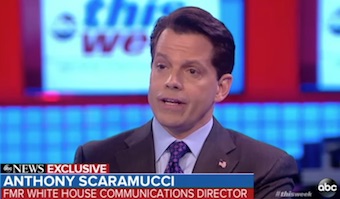|
|
He must be intelligent, given his success as a businessman. But when the subject is journalism, Anthony Scaramucci, Trump’s short-lived communications director, deserves a failing grade.
This was evident during an August appearance on “This Week” with ABC's George Stephanopoulos, when Scaramucci kept repeating that he thought his vulgar comments to a journalist were off-the-record.
It’s been decades since most reporters would clean up quotes and eliminate negative news from stories to protect someone, barring Fox TV, of course. The 24-hour news cycle has necessitated reporters changing their methods: Getting it first, even at the expense of accuracy, is now a standard practice, as is stories that will generate coverage for several days instead of one news cycle. Scaramucci should’ve known that, given he was to be in charge of White House communications.
 |
Many years ago, when I was a novice reporter, journalists would acknowledge that PR people were just doing their job. The relationships between reporters and PR pros were much more cordial and personal than they are today. Often, that relationship resulted in reporters doing favors for PR people. That’s largely disappeared, as so many reporters are chained to their desks or laptops because of the 24-hour news cycle, and simply don’t have time to socialize with PR folks.
When I transitioned to public relations, and as newspapers began to disappear, most reporters would honor “off-the-record” conversations. But some would say — as I did during my reporting days — that “if it’s off- the- record, don’t tell me.” Even in those friendlier days, I advised clients not to make off-the-record statements. Today, with the 24-hour news cycle, it’s more important than ever for clients and PR people to tell journalists only what’s fair game for attribution. Just ask Mr. Scaramucci.
At one time, “off-the-record” conversations with journalists were considered a smart PR tactic. Many in our business still think it is. But I never practiced it — perhaps because I started out as a journalist — because I don’t think it ever makes for intelligent PR.
As a former newsman, with more than 30 years in the public relations business, I always advised clients against making comments to journalists unless they were “on the record.” That’s because “not for attribution” or “off-the-record” mean different things to different journalists.
To some journalists it might mean the information can be used in a manner making it difficult to identify the source or organization. Others might feel it’s okay to identify the organization but not the source. Some reporters might chop up the information and use it in several subsequent stories. In all cases, you have often relinquished control over how or when the information will be used.
I’ve arranged hundreds of interviews during my public relations career and have never had a reporter ask me, or the person being interviewed, for “off-the-record” information. It was always offered by the person being interviewed, despite my advising clients prior to the interview that anything you say may be used, despite your saying it’s off the record.
PR people and clients should remember that the reporter’s job is to report and not to do favors for PR people or be secret keepers. They should never forget Niccolo Machiavelli’s famous quote from The Prince: “The promise given was a necessity of the past: the word broken is a necessity of the present.”
Advice to novice PR people and people being interviewed: Loose lips often result in negative stories and sink reputations. I’m sure Mr. Scaramucci would concur.
***
Arthur Solomon was a senior VP at Burson-Marsteller. He now is a contributor to public relations and sports business publications, consults on PR projects and was on the Seoul Peace Prize nominating committee. He can be reached at [email protected].

 Arthur Solomon
Arthur Solomon 
 Republican tough guys Josh Hawley and Tom Cotton want Biden to send the National Guard to Columbia University to put an end to student protests... Bernie blasts Bibi for insulting America's intelligence by equating criticism of Israel's government with antisemitism... German court convicts former financial PR exec who claims he wasn't aware that trading on tips is illegal.
Republican tough guys Josh Hawley and Tom Cotton want Biden to send the National Guard to Columbia University to put an end to student protests... Bernie blasts Bibi for insulting America's intelligence by equating criticism of Israel's government with antisemitism... German court convicts former financial PR exec who claims he wasn't aware that trading on tips is illegal.  Southern governors claim they know what's best for their working class, and it's not pay raises... A Ukrainian human rights group played a key role in convincing House Speaker Mike Johnson to hold a vote to send arms to Ukraine, Israel and Taiwan... Trump Media & Technology Group blames short-selling and not lousy outlook for its stock slump.
Southern governors claim they know what's best for their working class, and it's not pay raises... A Ukrainian human rights group played a key role in convincing House Speaker Mike Johnson to hold a vote to send arms to Ukraine, Israel and Taiwan... Trump Media & Technology Group blames short-selling and not lousy outlook for its stock slump. The techniques deployed by OJ Simpson's defense team in the 'trial of the century' served as a harbinger for those used by Donald Trump... People worry about the politicization of medical science just as much as they fret about another pandemic, according to Edelman Trust Barometer... Book bans aren't restricted to red states as deep blue Illinois, Connecticut and Maryland challenged at least 100 titles in 2023.
The techniques deployed by OJ Simpson's defense team in the 'trial of the century' served as a harbinger for those used by Donald Trump... People worry about the politicization of medical science just as much as they fret about another pandemic, according to Edelman Trust Barometer... Book bans aren't restricted to red states as deep blue Illinois, Connecticut and Maryland challenged at least 100 titles in 2023. The NBA, which promotes legalized gambling 24/7, seems more than hypocritical for banning player for placing bets... Diocese of Brooklyn promises to issue press release the next time one of its priests is charged with sexual abuse... Truth Social aspires to be one of Donald Trump's iconic American brands, just like Trump University or Trump Steaks or Trump Ice Cubes.
The NBA, which promotes legalized gambling 24/7, seems more than hypocritical for banning player for placing bets... Diocese of Brooklyn promises to issue press release the next time one of its priests is charged with sexual abuse... Truth Social aspires to be one of Donald Trump's iconic American brands, just like Trump University or Trump Steaks or Trump Ice Cubes. Publicis Groupe CEO Arthur Sadoun puts competition on notice... Macy's throws in the towel as it appoints two directors nominated by its unwanted suitor... The Profile in Wimpery Award goes to the Ford Presidential Foundation for stiffing American hero and former Wyoming Congresswoman Liz Cheney.
Publicis Groupe CEO Arthur Sadoun puts competition on notice... Macy's throws in the towel as it appoints two directors nominated by its unwanted suitor... The Profile in Wimpery Award goes to the Ford Presidential Foundation for stiffing American hero and former Wyoming Congresswoman Liz Cheney.


 Have a comment? Send it to
Have a comment? Send it to 
No comments have been submitted for this story yet.